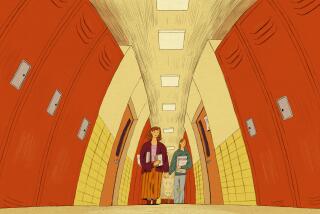Video Yearbooks Capture School Memories in Motion for Seniors
- Share via
NEW YORK — Now that 55% of American homes have VCRs, tens of thousands of high school and college graduates will be buying video yearbooks as well as printed yearbooks as souvenirs of their senior year.
Video yearbooks got their start at Duke University, Durham, N.C., seven years ago and took hold at schools on the East Coast before spreading west. Until now they have been produced by schools themselves, with the help of small video concerns such as YearLook Enterprises in Durham, which has 40 high school and college clients.
YearLook is producing a first video yearbook for Rye Country Day School, Rye, N.Y., which has 320 high school students, of which more than 150 have signed up for the tape. It is strictly a student project with “a lot of people taking pictures and two students with my help doing the editing,” according to Morrow Jones, who teaches film making at the school.
Jones’ wife, Susan, adviser to the school’s print yearbook staff, said the video yearbook is in no way considered competition to the regular yearbook but is designed for students who want “an action and sound souvenir of graduation and our basketball season’s most exciting game--things the print yearbook couldn’t possibly have.
“The kids absolutely love what they have put together so far,” she said.
Beginning next year, Jostens of Minneapolis, a Fortune 500 company that is one of the nation’s graduation products giants, will begin publishing video yearbooks, editing campus-made tapes and adding personalized and commercial video material.
Marty Allen, director of product development for Jostens, described the video yearbook as “a really hot trend--the first new thing in the graduation market in years.”
Robert Levitan, who pioneered the concept at Duke and started YearLook, said the interest in video yearbooks “is nothing less than an explosion.”
“We’ve been observing the growing interest for video yearbooks for some time and made the decision to enter the market about two months ago,” Allen said. “We already print yearbooks for 14,000 schools and colleges and our video line will be a complement to these existing books.
“We decided to be the first of the big yearbook firms to get into this business because we are dealing with the first generation of students to live in the video age and want the motion, sight and sound that you get on tape that you can’t get out of a printed book,” Allen said. “We will be putting out a videotape in a cassette box that will actually look like a yearbook for only $30 to $40, about the same price as a printed yearbook.”
Educational organizations estimate that about 500 high schools and colleges from coast to coast are producing their own video yearbooks. One of the pioneers in the field was Abilene Christian College in Abilene, Tex. Dutch Hoggatt, who originated the Abilene yearbook when he was a member of the journalism faculty, said, “We thought it was a nice project for the students.”
“Actually putting out a video yearbook only involves a small number of students, maybe only one or two making tapes and even doing their own editing,” Hoggatt said. “These are highly motivated and creative students and they turn out a quality product. Normally I try to pay these students a monthly salary, but some do it only for the experience.
“There were some fears on the part of the printed yearbook staff that we were infringing on their market, but we never were really in competition. Students who buy the printed book don’t automatically buy the video book too. It’s a matter of preference and what the student can afford.”
Jostens will supply its school and college clients with VHS cameras and training manuals for students who will use them. Tapes will be sent to the company for editing and added footage, which will include current events that took place during the student’s senior year and popular songs of the year. Sixty seconds of personalized material about a student will be included at an extra charge.
“The generic tape that each student will get whether or not he wants personalized stuff will include shots taken in schoolrooms, cafeteria, at athletic events and homecomings, the senior prom and commencement exercises,” Allen said. “There will be still images as well as moving ones. The tape will run 45 to 60 minutes.”
Small portable cameras are used by the students, notably the half-inch camcorder unit, which is about the size of a 35-millimeter camera with a big lens. Allen said the training course that comes with the cameras will prepare students to go into video work professionally if they want to.
“So far, the video yearbook idea has been more successful at high schools than at colleges, except for small colleges,” Hoggatt said. “It’s a product that appeals to a small, homogenous student body that has shared a lot of campus living, not to a large student body with fewer and more impersonal intramural experiences.”
More to Read
Inside the business of entertainment
The Wide Shot brings you news, analysis and insights on everything from streaming wars to production — and what it all means for the future.
You may occasionally receive promotional content from the Los Angeles Times.










